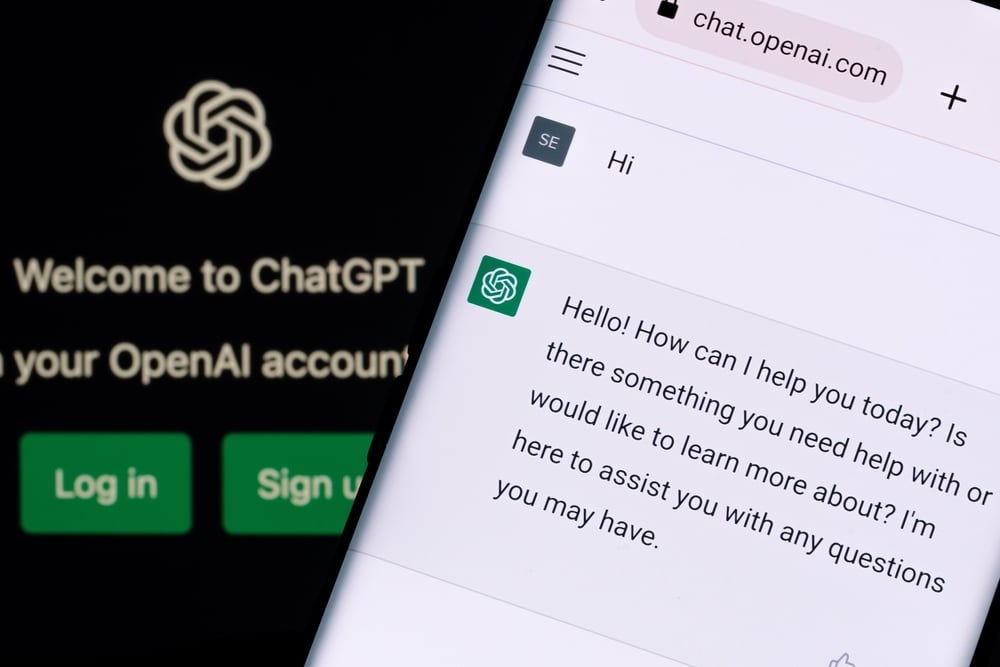
ChatGPT: what we know so far
AI chatbot ChatGPT has sent the internet into a frenzy. What do we really know about this latest disruptor in the technology world and how are companies already utilising it?
On 30 November 2022 San Francisco-based artificial intelligence company OpenAI released ChatGPT, a chatbot that is now recognised globally for its human-like manner when responding to queries. Only two months after its launch, ChatGPT reached more than 100 million unique visitors. In January this year, the AI platform had 590 million visits alone.
ChatGPT has already made a significant impact on the world of AI and technology since its release. With an influx of users utilising its services, it has become one of the most popular AI chatbots today and is being used in a variety of ways, from supporting small businesses to academic cheating. While it represents a glimpse into the future of AI, it is also surrounded by controversy as the potential loss of jobs and other implications are considered. Despite these limitations, ChatGPT has proven to be a creative and authoritative conversational AI, offering stilted yet informative responses by drawing on vast amounts of information from the internet.
Learn more about this viral AI chatbot along with its uses, positives and negatives, and potential competitors.
ChatGPT overview
- What is ChatGPT?
- Not-so-everyday examples
- Positives
- Negatives
- ChatGPT’s potential competitors
Key takeaways
- ChatGPT is an AI chatbot that has broken the internet with its disruptive methods – allowing users to ask an unlimited number of questions on a variety of topics
- Organisations and public institutions around the globe are using ChatGPT to aid in their roles and day-to-day jobs despite the controversy surrounding the chatbot
- Some businesses use ChatGPT to improve processes and tasks within their functions while others are still wary of its potential negative effects
- Other AI platforms are surfacing in a race to take the spotlight away from ChatGPT
What is ChatGPT?
In short, ChatGPT is a large language model AI chatbot. Large language models are deep learning algorithms that can predict and produce text based on existing knowledge from datasets and other similar sources.
Developed by OpenAI based on GPT-3.5, the chatbot allows users to ask questions ranging from writing a specific line of programming code (such as java script) to compiling song lyrics. Before the creation of ChatGPT, OpenAI was renowned for DALL·E, an AI system that is able to generate realistic images and art through written prompts.
OpenAI is continuing to offer users free access to ChatGPT; they are able to create an account using their Gmail or Microsoft email. For those in search of a speedier service, OpenAI recently released a paid version of the AI chatbot called ChatGPT Plus that has faster response times and works while others are receiving the “ChatGPT is at capacity right now” message. The subscription itself is set at $20 per month (£16) allowing general access to the platform and first dibs on any of their new features.
Not-so-everyday examples
ChatGPT has been criticised by many for its limitations in aspects such as training data and bias issues. Meanwhile, some have welcomed the chatbot with open arms and have incorporated it into their jobs and routines. Below are a few examples:
Passing judgement: A judge in Cartagena, a port city located in Colombia’s Caribbean coast, admitted to using ChatGPT to aid in one of his court rulings. Juan Manuel Padilla used the artificial intelligence chatbot to decide whether an autistic child’s medical insurance would be able to pay off his treatment. ChatGPT assisted the judge by asserting that any children diagnosed with autism do not need to pay any fees for their medical treatment.
Teacher’s pet: A number of teachers and educators have rejected the idea of students using the AI chatbot to complete homework and other assignments. On the other hand, Ethan Mollick, an Entrepreneurship and Innovation Professor at Wharton School, University of Pennsylvania, is encouraging students to use ChatGPT in their studies. Despite adopting this new AI policy, Mollick requires his students to fact-check any responses.
Inspiring the masses: On February 3 2023, Israel’s president, Isaac Herzog, delivered a speech partly written by ChatGPT. After delivering the beginning of his speech at Cybertech Global Tel Aviv 2023 to an estimated 20,000 attendees, Herzorg revealed that this opening section (in addition to the ‘inspirational’ quote at the end) was written by the AI chatbot.
Positives
According to HotTopics community member Adrian Samareanu, AI and machine learning are needed to achieve operational efficiency with the automation of processes. In the same roundtable debate, OneFootball’s CDO, Kshitij Kumar, also argued that AI can make a difference in organisations.
ChatGPT integration into companies can enhance their productivity, resulting in a seamless and more efficient experience for customers. For example, programmers could utilise ChatGPT for writing basic code in languages ranging from Python to Javascript. For marketing companies in need of inspiration for social post captions, the AI chatbot is able to compile basic copywriting. Furthermore, the technology can help lower overhead costs as it replaces teams who handle direct inquiries or entry-level tasks.
In addition to the outlined benefits, ChatGPT can also be used to generate leads for businesses and enterprises. This can be achieved through communication with potential clients by securing their contact information and delivering customised messages or offers directly to their inbox. Integrating the AI chatbot into the social media side of the business can also be beneficial. Actively engaging with audiences by managing the company’s social media presence can become less demanding with ChatGPT.
Negatives
With AI and other forms of chatbot technology carrying out a variety of tasks, individuals within teams are worried that they could be displaced. One workplace task that is categorised as vulnerable in the face of ChatGPT is computer programming. A few of the chatbot’s many uses includes compiling basic programming and coding, writing basic administrative emails and mid-level writing. In a Studio roundtable debate Jonathan Reichental, Founder of Human Future, argued: “We can’t compete against the robots”. His belief is that in the next ten years or so, we could see a displacement of around 20 percent of the world’s workforce.
On February 2 2023, Blackberry published new research in a press release stating that ChatGPT may have been used in “Nation State Cyberattacks”. The company conducted a survey where they questioned 1,500 IT leaders across North America, UK and Australia. Over 70 percent of these leaders acknowledged its potential threat to cybersecurity and have expressed concern. Up to half of these technologists believed that ChatGPT would help enable less experienced hackers to improve and develop their skills and use it for malicious activity.
ChatGPT’s potential competitors
Bard: Google recently introduced the AI chatbot, Bard. Categorised as an AI-powered search assistant, it is said that Bard could help Google remain the dominant search engine on the block. The new AI software is powered using their model version of Language Model for Dialogue Applications (LaMDA), which is trained on vast amounts of data from across the internet.
OPT: On May 3 2022, Meta AI introduced OPT in Open Pre-trained Transformer Language Models. Currently fine-tuned across 2,000 tasks, the AI is based on a model with 30 billion parameters, making it a large language model with a high level of processing power and training data requirements.
Bloom: Considered the world’s largest open-access multilingual large access model, Bloom has more than 176 billion parameters. Trained by NVIDIA AI, a platform used by more than 35,000 companies globally, Bloom can generate text in 46 different languages and 13 programming languages.
Final thoughts
While ChatGPT and AI in general is considered to be a guiding principle for some organisations, others are not so optimistic. We have established that the AI chatbot can be used to answer the simplest questions as well as legal ones, but is this where it stops? Probably not.
ChatGPT has raised concerns among different organisations and industries because of its simplification of everyday processes like copywriting and basic programming and is already entering the jobs market, which is an already volatile state. On the other hand, it’s argued that ChatGPT, and its potential competitors, need human input to guide it creating new jobs and skill sets.
Interested in learning more about HotTopics’ insights? Register today and become a member of our exclusive C-suite community.
SUBMIT A COMMENT
RELATED ARTICLES
Join the community
To join the HotTopics Community and gain access to our exclusive content, events and networking opportunities simply fill in the form below.
